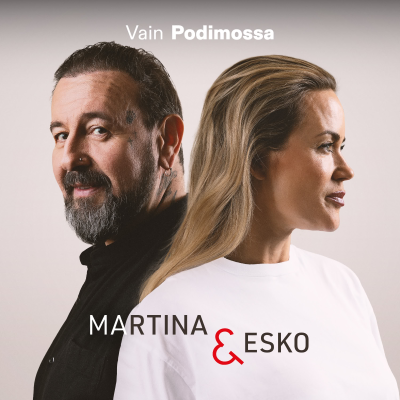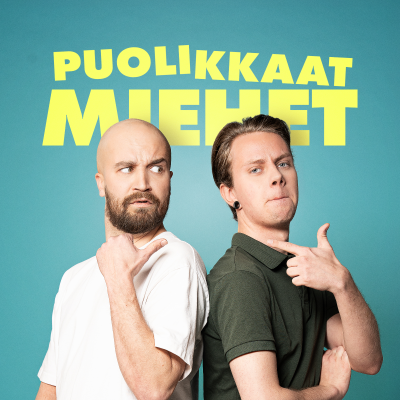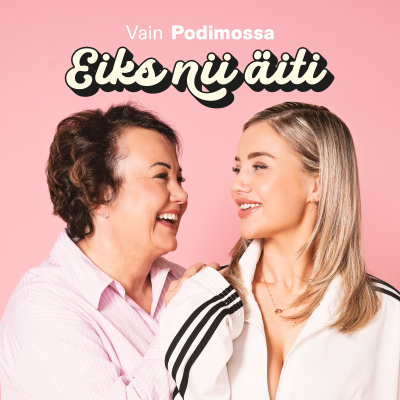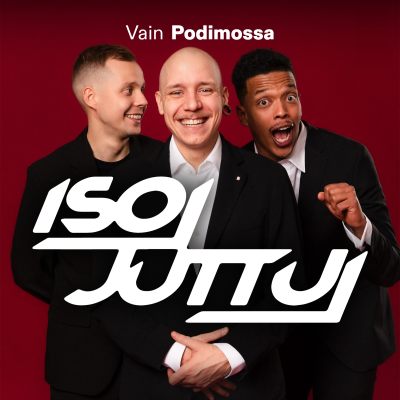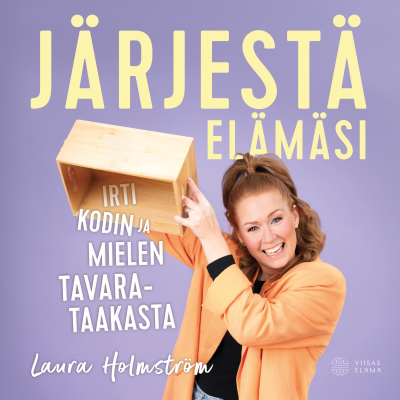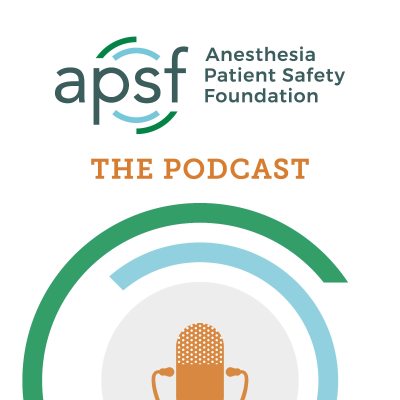
Anesthesia Patient Safety Podcast
englanti
Teknologia & tieteet
Rajoitettu tarjous
2 kuukautta hintaan 1 €
Sitten 7,99 € / kuukausiPeru milloin tahansa.
- Podimon podcastit
- Lataa offline-käyttöön
Lisää Anesthesia Patient Safety Podcast
The official podcast of the Anesthesia Patient Safety Foundation (APSF) is hosted by Alli Bechtel, MD, featuring the latest information and news in perioperative and anesthesia patient safety. The APSF podcast is intended for anesthesiologists, anesthetists, clinicians and other professionals with an interest in anesthesiology, and patient safety advocates around the world.The Anesthesia Patient Safety Podcast delivers the best of the APSF Newsletter and website directly to you, so you can listen on the go! This includes some of the most important COVID-19 information on airway management, ventilators, personal protective equipment (PPE), drug information, and elective surgery recommendations.Don't forget to check out APSF.org for the show notes that accompany each episode, and email us at podcast@APSF.org with your suggestions for future episodes. Visit us at APSF.org/podcast and at @APSForg on Twitter, Facebook, and Instagram.
Kaikki jaksot
295 jaksot#295 From OR To YouTube: What Happens When Patient Safety Meets Digital Storytelling
Curiosity can change a career—and a field. We sit down with pediatric cardiac anesthesiologist and creator Dr. Max Feinstein to trace how a love of ethics, a pandemic schedule, and a phone camera evolved into a mission to make anesthesia safer through clear, accessible education. From the first CA1 walk throughs to high-stakes cardiac cases, Max explains how video demystifies monitors, medications, and moments that raise anxiety for patients and challenge new clinicians. We dig into the roots of patient safety—why medication errors still matter, how standardized setups and closed-loop communication reduce risk, and where pediatric data remains thin. Max shares the unexpected insights from filming veterinary anesthesia, revealing shared tools and parallel workflows across species. He also talks candidly about the hardest shoot: obtaining layered consent in the OR, balancing transparency with compassion, and earning trust from everyone in the room. Now serving as the inaugural APSF digital editor, Max walks us through building collaborative patient-safety videos on platforms people actually use. Think opioid safety explained for patients, monitoring made visual for trainees, and practical lessons from human factors that stick when the pressure is high. Along the way, we highlight how partnerships with experts, attorneys, and working groups help turn guidelines into engaging stories that change behavior, not just views. If you care about anesthesia patient safety, pediatric cardiac care, or how medical education is evolving on YouTube and beyond, this conversation offers tools you can use today. Subscribe, share with a colleague, and leave a review with the safety topic you want us to unpack next. For show notes & transcript, visit our episode page at apsf.org: https://www.apsf.org/podcast/295-from-or-to-youtube-what-happens-when-patient-safety-meets-digital-storytelling/ [https://www.apsf.org/podcast/295-from-or-to-youtube-what-happens-when-patient-safety-meets-digital-storytelling/] © 2026, The Anesthesia Patient Safety Foundation
#294 From Video Laryngoscopy To ECMO: What Keeps Airway Management Safe
When air meets uncertainty, judgment matters most. We dig into the evolving landscape of airway management where video laryngoscopy, supraglottic devices, and even ECMO promise better outcomes, yet cognitive errors and non‑OR settings still account for many of the most devastating events. Drawing on recent studies, malpractice claims, and national audits, we map the pressure points that turn a difficult intubation into a crisis and show how to defuse them with clearer plans, tighter teamwork, and sharper skills. We start with three high‑yield rules that change outcomes fast: cap the number of attempts, anticipate physiologic crashes, and switch early to rescue strategies. From there, we unpack the INTUBE findings on hypoxemia and cardiovascular instability, plus data showing how repeated attempts compound failure. Video laryngoscopy gets a balanced look: why it lifts first‑pass success across ED and ICU intubations, and how overreliance can silently erode direct laryngoscopy and awake fiberoptic competence. Expect practical strategies to preserve breadth: intentional DL reps, awake FOI workshops, and shared mental models that define time limits and bailout triggers. We also tackle unsettled ground. Aspiration risk reduction remains murky; cricoid pressure under general anesthesia has not delivered clear benefits, and robust trials comparing asleep rapid‑sequence to awake, topicalized methods in high‑risk patients are missing. We offer a decision lens to tailor approach by anatomy, physiology, and available expertise. For extreme airways—think massive goiter or tracheal compression—we explore where ECMO fits: preemptive, standby, or rescue. You’ll hear how activation criteria, cannulation readiness, and interprofessional rehearsal turn a complex tool into a safety net rather than a new hazard. By the end, you’ll have a cleaner playbook: plan A–D that you can execute under stress, a review of device trade‑offs, and concrete ways to reduce cognitive traps that drive harm. If this conversation sharpens your next airway, share it with a colleague, subscribe for future episodes, and leave a quick review to help others find the show. For show notes & transcript, visit our episode page at apsf.org: https://www.apsf.org/podcast/294-from-video-laryngoscopy-to-ecmo-what-keeps-airway-management-safe/ [https://www.apsf.org/podcast/294-from-video-laryngoscopy-to-ecmo-what-keeps-airway-management-safe/] © 2026, The Anesthesia Patient Safety Foundation
#293 Reimagining Anesthesia With AI, Wearables, And Safety Culture
What if the anesthesia workstation could see trouble coming and stop it before it starts? We explore how anesthesia moves from reactive to predictive by blending AI, medical-grade wearables, and closed loop systems with a strong safety culture. The story of Alex—a 75-year-old who developed postoperative delirium and fell—anchors the stakes and shows how early signals, if recognized and acted on, can change a life. We break down practical uses of machine learning in the perioperative space: forecasting hypotension minutes ahead, integrating multimodal physiologic data for real-time decision support, and taming alarm fatigue with smarter, context-aware alerts. From operating room monitors to infusion pumps, interoperability turns scattered data into timely action. Automation takes the next step with closed loop control. Imagine EEG-guided dosing that keeps hypnosis within target ranges, fluid and vasopressor titration that stabilizes hemodynamics, and a supervisory controller that coordinates these loops so clinicians can focus on communication, situational awareness, and patient advocacy. Through it all, safety culture remains the foundation: psychological safety, shared learning, and consistent prioritization of safety over short-term operational pressures. Technology should amplify the human connection, not replace it. You’ll leave with a clear view of what to pilot now—AI decision support in high-yield scenarios, targeted wearable programs for high-risk pathways, and structured training that embeds safety into daily practice. If this vision sparks ideas or questions, reach out and join the conversation. Subscribe, share with a colleague who cares about perioperative safety, and leave a review to help more clinicians find the show. For show notes & transcript, visit our episode page at apsf.org: https://www.apsf.org/podcast/293-reimagining-anesthesia-with-ai-wearables-and-safety-culture/ [https://www.apsf.org/podcast/293-reimagining-anesthesia-with-ai-wearables-and-safety-culture/] © 2026, The Anesthesia Patient Safety Foundation
#292 Forty Years Of Obstetric Anesthesia Progress And The Work Ahead
Maternal safety has never mattered more, and the stakes span far beyond the delivery room. We revisit four decades of progress in obstetric anesthesia—from safer neuraxial techniques and airway strategies to medication safeguards—and then get honest about what still puts patients at risk. With author insights and frontline examples, we connect the dots between evidence, teamwork, and the lived experience of childbirth to show where anesthesia can lead meaningful change. Rising patient complexity reshapes our role. We lean into risk stratification with the Obstetric Comorbidity Index, proactive antenatal planning, and sustained postpartum follow-up. We address maternal mental health and substance use disorder with trauma-informed care and smarter pain plans. And we face inequity directly—why Black women bear disproportionate harm and how standardized pathways, equitable escalation, and advocacy move outcomes in the right direction. Looking ahead, we explore point-of-care ultrasound for neuraxial guidance and aspiration assessment, AI-driven tools for early detection, wearables for postpartum monitoring, and enhanced recovery after cesarean to cut variation and strengthen reliability. Subscribe, share with a colleague on labor and delivery, and leave a review with one change you’ll make this week to advance maternal safety. For show notes & transcript, visit our episode page at apsf.org: https://www.apsf.org/podcast/292-forty-years-of-obstetric-anesthesia-progress-and-the-work-ahead/ [https://www.apsf.org/podcast/292-forty-years-of-obstetric-anesthesia-progress-and-the-work-ahead/] © 2026, The Anesthesia Patient Safety Foundation
#291 Managing Anesthesia Risks for Patients with Acute and Chronic Cocaine Use
A cocaine-positive patient rolls into the OR and the monitors look fine—until twenty minutes after induction, when the blood pressure plummets. We unpack that swing from sympathetic surge to sudden crash through two real cases: an emergent trauma laparotomy complicated by asystole and a chronic intranasal user with profound hypotension that only responded to direct-acting vasopressors. From there, we connect the dots to the pharmacology that makes these events predictable and, with the right plan, manageable. We talk candidly about what matters before wheels-in: timing of last use, objective signs of toxicity, and targeted testing. You’ll hear why urine screens can stay positive for weeks, why indirect agents like ephedrine can fail, and how phenylephrine or norepinephrine often become first-line choices. For regional anesthesia, we flag contamination risks and local anesthetic systemic toxicity concerns that call for dose adjustment and intralipid readiness. Chronic cocaine use adds another layer, including left ventricular dysfunction, myocardial infarction and fibrosis, and calcium dysregulation. Hospital policy and equity loom large. Automatic cancellations for cocaine positive patients can worsen pain, delay care, and disproportionately impact patients with limited access. We review current evidence suggesting many asymptomatic, cocaine-positive patients tolerate elective noncardiac surgery under general anesthesia with hemodynamics comparable to controls when vigilant management is in place. The takeaway: build flexible, evidence-informed pathways that prioritize patient safety without reflexive delays, and keep a rescue mindset with careful monitoring and direct vasopressors within reach. If this sparked ideas for your practice, subscribe, share with a colleague, and leave a review so more clinicians can find these insights. For show notes & transcript, visit our episode page at apsf.org: https://www.apsf.org/podcast/291-managing-anesthesia-risks-for-patients-with-acute-and-chronic-cocaine-use/ [https://www.apsf.org/podcast/291-managing-anesthesia-risks-for-patients-with-acute-and-chronic-cocaine-use/] © 2026, The Anesthesia Patient Safety Foundation
Valitse tilauksesi
Rajoitettu tarjous
Premium
Podimon podcastit
Lataa offline-käyttöön
Peru milloin tahansa
2 kuukautta hintaan 1 €
Sitten 7,99 € / kuukausi
Premium
20 tuntia äänikirjoja
Podimon podcastit
Lataa offline-käyttöön
Peru milloin tahansa
30 vrk ilmainen kokeilu
Sitten 9,99 € / kuukausi
Premium
100 tuntia äänikirjoja
Podimon podcastit
Lataa offline-käyttöön
Peru milloin tahansa
30 vrk ilmainen kokeilu
Sitten 19,99 € / kuukausi
2 kuukautta hintaan 1 €. Sitten 7,99 € / kuukausi. Peru milloin tahansa.
